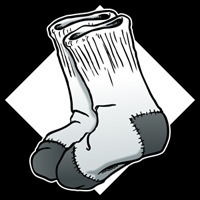| « Children's Bicycle Safety in Chicago | Golden Bowl III to Showcase Some of the World's Top Derby Talent » |
White Sox Fri Jul 19 2013
White Sox Summer Reading: 'Crash,' Dick Allen's Story
 Though Dick Allen was one of the most talked about players in baseball during his career, in the decades since his exit from the game he's one of the least talked about baseball greats.
Though Dick Allen was one of the most talked about players in baseball during his career, in the decades since his exit from the game he's one of the least talked about baseball greats.
It's a paradox, but it's true. Allen was one of the most controversial players in MLB during the 1960s and 70s, always in the headlines in the sports sections for the wrong reasons. Now? Allen hasn't gotten the recognition he has deserved as one of the best hitters in the game, someone who was an all-around force on the baseball field.
Allen, who spent his best years with the Phillies and White Sox, finished his career with 351 home runs, and a slash line of .292/.378/.534. That's a .912 career OPS, the 55th best of all-time (and better than Mike Schmidt and Willie Stargell). He won the 1972 AL MVP award, carrying a Sox team filled with nobodies to 87 wins and a second-place finish. Yet Allen isn't in the hall of fame and is hardly remembered, save for baseball diehards.
Dick Allen shares his story in the 1989 book, Crash: The Life and Times of Dick Allen, by Allen and writer Tim Whitaker. The book is a good one, and for the most part, Allen's life story comes straight from the horse's mouth.
The book mixes up styles, changing the writing format chapter by chapter. Some chapters are told in Allen's first-person voice, like his story on his years in Philadelphia in the 1960s. Others are in the form of an interview between Whitaker and Allen, who is referred to as "The Ballplayer" throughout the book. The best chapters, though, are short quick-hit stories told in the third-person, where Allen recalls moments from his playing days.
Allen tells stories about doodling in the dirt, and writing messages to fans, teammates and even umpires while manning first base. In the minors and chasing a batting crown with another player, Allen tried to sabotage his rival by out-drinking him at a bar, only to have it backfire. There are stories on Allen's friend Alex Johnson calling everyone he talked with a rude insult (a compound word, with the second part being "head"). Stories on Allen challenging Greg Luzinski to an old-timers home run derby and Allen challenging a group of men to a doo-wop singing competition in a Philadelphia bar.
We also get glowing quotes from people who knew the ballplayer. Chuck Tanner, the Sox manager in 1972, stands out in particular. He said that Allen carried the team that year, and that Allen had the best year of any White Sox player ever. "In my mind," Tanner said, "Allen was the greatest White Sox player to ever wear the uniform."
Yet Allen had his problems. Through the first-person style, Allen reveals that he drank before, and even during, games. He loathed sportswriters, and when he didn't feel like talking with them he would gladly blow them off (leading to negative publicity). He feuded with managers who didn't treat him the way he wanted. He had no qualms about leaving his team for extended periods if he was hurt or if he didn't like his situation.
This goes back to the beauty of this book. Whitaker never writes anything bad about Allen - in the epilogue, the author actually says he loves Allen and considers him a friend - but he lets the ballplayer do the talking, and the reader to make his or her own inferences. Baseball was very conservative in the 1960s, and there was no way a free-spirited black ballplayer would ever get a fair shake in the league. But then again, Allen never viewed his actions from anyone else's perspective, either.
The book is only 189 pages, and it is a very quick read - I finished it in two days in three sittings. It's also a lighter read than I thought, more fun than it is dramatic. The Chicago Public Library has it, as does Amazon and Abe Books.
Whether Allen was treated unfairly in baseball or Allen brought his troubles on himself, there was one overriding theme in the book that is an undisputed fact: Allen liked to be left alone. He did what was best for him and didn't like management dictating what he should do. He coped with life and baseball difficulties by taking long solo car rides, and he achieved the most peace when he was by himself with his horses.
The most poignant quote in the book comes from one of Allen's cousins, who says that Allen was always someone who preferred to be alone, even as a child. "If Dickie could have played his major league career in empty ballparks - no fans, no media - he would have hit eight hundred, nine hundred home runs. He would have made people forget about Hank Aaron."
Instead, we've forgotten about Dick Allen.
My rating: 16/20
Baseball equivalent: A hard-hit double into the gap









ron / August 6, 2014 3:08 PM
Dick Allen, Mr. Play it my way or else - one of the greatest hitters I ever saw or heard about. Too bad he was an alcoholic.